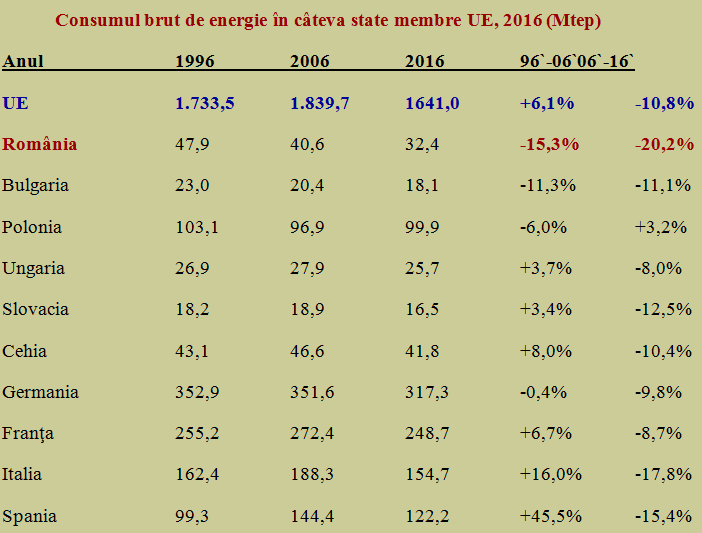 According to the data published by Eurostat, Romania recorded the biggest decline in the gross energy consumption between 1996 and 2016 and the cumulated value over the two decades is -32.4%.
According to the data published by Eurostat, Romania recorded the biggest decline in the gross energy consumption between 1996 and 2016 and the cumulated value over the two decades is -32.4%.
The negative rhythm was against the general trend of the EU in the first ten years under review and intensified along the way when the trend has reversed.
Following the dismantling of some significant production capacities, between 1996 and 2006, we were „champions” among the few current EU member states that have reduced their energy consumption and not for reasons related to the efficiency in consumption by implementing more advanced technologies, like it was the case in Germany (0.4%).
*
- Gross energy consumption in some EU states
- Year
*
Between 2006 and 2016, with a value of -20.2%, we rank in the European top of energy consumption decrease after Greece (-23.6%), strongly affected by the economic crisis, and small Malta (-22.5%). With the important amendment that, unlike us, these countries had previously seen significant increases (+ 28.7% and 26.2%, respectively), which means in 2016 they were above the 1996 level.
More important, however, would be the position in the regional context, among former Eastern bloc colleagues, and the comparison with the major European economies.
Neighbours from the southern side of the Danube and colleagues in the 2007 accession wave had a similar but more limited decline (-21.1% cumulated). Beyond the initial rebound of the domestic market, restoring the access to foreign markets, with the privatizations, made us net losers.
Reducing energy consumption: Declining economic activity versus consumption efficiency
Poland and Hungary, with which we have major deficits in terms of foreign trade because of the competitiveness, have registered moderate decreases, due to the increase in the consumption efficiency and not the decrease in the economic activity, the same as the Czech Republic and Slovakia, which got much closer in time by the general European trend.
The analysis becomes more complicated, though, due to the restoration of the economic structure to other coordinates than those from some decades ago, with negative effects now because of the diminishing in some energy-intensive activities and potential positive effects at some point in the future in terms of obtaining more added value in less energy-intensive fields.
Basically, we are talking about a more or less wanted paradigm change in development, with the partial abandonment of the heavy industries (petrochemicals, steel industry, etc.), and in the case of others, rather about adding some parametric adjustments of these industries towards lower consumption.
Maybe we can learn something from foreign debt story
The EU cannot afford to waste energy. Improving efficiency in energy consumption is the best way to reduce harmful emissions, increase energy security, improve competitiveness and enable more consumers to access this resource. In the long run, energy efficiency is a key factor in preventing climate changes.
The irony of fate, following the adventures in the privatization, after losing some important foreign markets, and starting a chronic deficit in the international commodity exchanges, Romania is the only European country that has already achieved the goal of reducing the energy consumption, set for 2030.
What, paradoxically, though not a good thing by the way it happened, it should perhaps be religiously maintained over the next decade (the experience with the external debt paid in 1989 in full, but under the pressure, should give us food for thought), by adapting the energy consumption of the new production capacities to the cutting-edge technologies.
*
Specifications
The EU adopted in 2007 the energy and climate targets for 2020 by which it committed to reduce greenhouse gas emissions by 20%, increase the share of renewable energies by 20% and improve the efficiency in using the energy by 20%. The commitment targets a primary energy consumption of less than 1,483 MTEP and a final energy consumption below 1,086 MTEP in 2020.
The acronym „TEP” refers to tons of oil equivalent, and the statistics make the conversion of all forms of energy into oil quantities by the calorific power of fuels other than oil and a conversion factor for electricity. 1 TEP equals 11.63 MWh (4.44 MWh in combustion in thermal power plants) or the energy contained in about 7 barrels of oil, depending on the product. 1 MTEP means 1 million tons of oil equivalent.
In 2014, an agreement was reached on a 27% reduction target for the EU’s energy consumption by 2030, and in 2016 it has been proposed an increase of this target by new efficiency increases, up to 30%.










